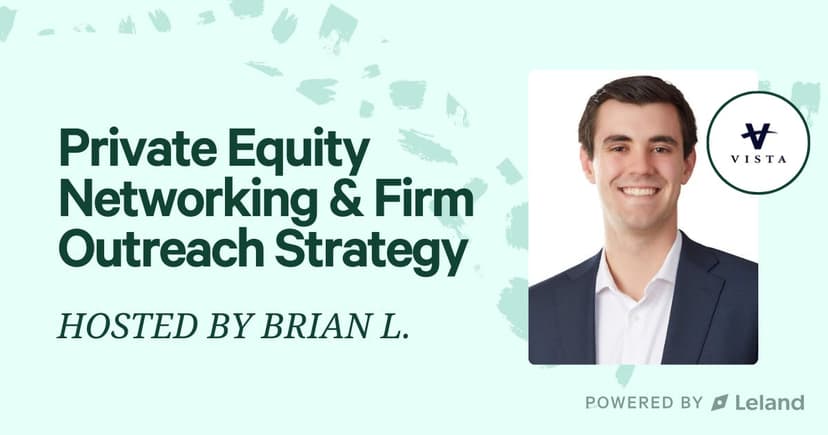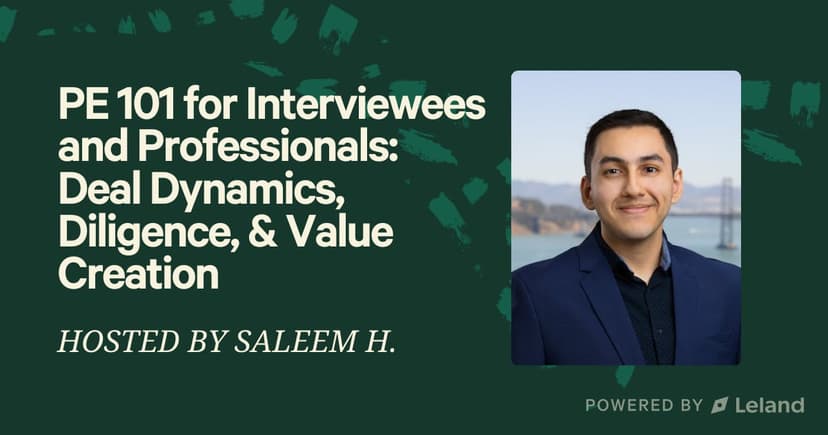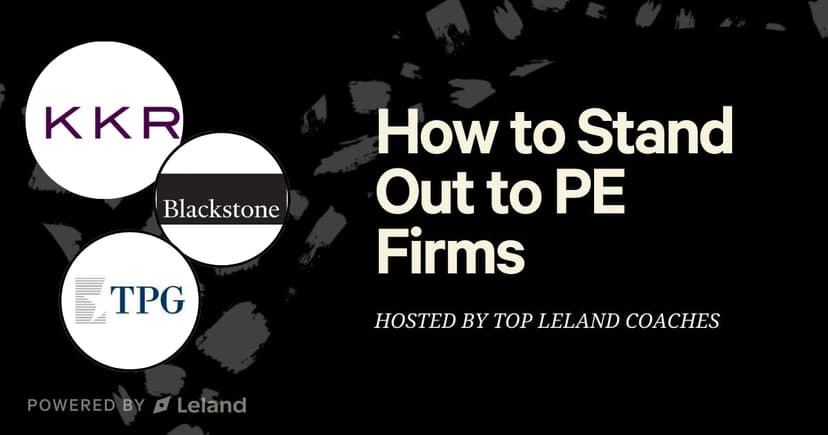A Guide to Mental Math for Your Private Equity Interview
Are you preparing for a private equity interview? This guide to mental math will help you sharpen your calculation skills and boost your confidence.
Posted June 13, 2025

Join a free event
Learn from top coaches and industry experts in live, interactive sessions you can join for free.
Table of Contents
If you are preparing for a private equity interview, one skill that you cannot overlook is mental math. In the highly competitive world of finance, being able to do quick calculations in your head can make all the difference. A strong command of mental math will enable you to make better decisions, analyze complex financial models faster, and impress your interviewers with your intellectual ability.
Why Mental Math is Important for Private Equity Interviews
Mental math is an integral part of the finance industry. In private equity, the ability to do quick and accurate calculations is crucial for analyzing deals and evaluating financial models. In an interview setting, you will be expected to perform mental calculations confidently and accurately. You'll also be expected to explain your thought process as you arrive at your answers. Additionally, mental math is a valuable life skill that can be applied in many other contexts.
Moreover, mental math can help you make better financial decisions in your personal life. Being able to quickly calculate percentages, discounts, and interest rates can help you save money and make informed decisions when it comes to budgeting, investing, and managing debt. It can also improve your problem-solving skills and boost your confidence in your ability to handle numbers and data.
The Benefits of Using Mental Math Techniques
There are many good reasons to invest time and effort into building your mental math skills. For one, it saves time. Mental math skills can help you quickly solve problems and make faster decisions. Mental math can also improve your accuracy and confidence, ensuring that you arrive at the correct answer in a timely manner. Additionally, the practice of mental math can reduce anxiety and improve your focus, which in turn leads to better performance in interviews.
Moreover, mental math techniques can be applied in various real-life situations, such as calculating tips, discounts, and taxes while shopping or dining out. It can also come in handy when managing personal finances, such as budgeting and calculating interest rates. Furthermore, mental math skills can be useful in various professions, including finance, engineering, and science, where quick and accurate calculations are essential.
How to Build Your Mental Math Skills for Private Equity Interviews
Mastering mental math requires consistent practice and dedication. Start by reviewing basic arithmetic concepts, including addition, subtraction, multiplication, and division. Next, learn mental math techniques that can be applied to more complex equations. Consider taking classes or watching online tutorials to learn more advanced mental math strategies. It's also essential to practice regularly so that you can quickly recall and apply mental math techniques in a high-pressure interview setting.
Another helpful tip for building your mental math skills is to practice with real-world examples. Look for opportunities to calculate percentages, ratios, and other financial metrics in your daily life. For example, when you're at the grocery store, try to estimate the total cost of your items before you reach the checkout. Or, when you're reading financial news, practice mentally calculating the impact of different market trends on investment returns. By incorporating mental math into your daily routine, you'll be better prepared to apply these skills in a private equity interview.
Effective Mental Math Strategies for Private Equity Interview Success
One useful tool for mastering mental math is visualization. This technique involves picturing the numbers in your mind and manipulating them to arrive at the answer. Another effective strategy is chunking, which involves breaking down large numbers into small, easily manageable parts. Additionally, memorizing multiplication tables and common fractions is crucial for quick mental calculations. Finally, you should have a solid understanding of percentages and ratios, as these concepts are frequently used in finance.
Another important mental math strategy is estimation. This involves making an educated guess about the answer based on the numbers involved. Estimation can be particularly useful when dealing with large numbers or complex calculations. It allows you to quickly determine if your answer is in the right ballpark, even if it's not exact.
It's also important to practice mental math regularly to improve your speed and accuracy. You can do this by setting aside time each day to work on mental math problems or by incorporating mental math into your daily routine. For example, you can try calculating the tip on a restaurant bill in your head or figuring out the total cost of items in your grocery cart before you reach the checkout.
Mastering Addition and Subtraction for Private Equity Interviews
Adding and subtracting numbers quickly and accurately is essential for mental math in private equity interviews. One helpful technique for adding is breaking down numbers into components and then adding up each part. For example, to add 396 + 217, you can think of it as (300 + 200) + (90 + 10) + (6 + 7) = 613. A similar approach can be used for subtraction. For example, to subtract 831 - 392, you can think of it as (800 - 300) + (30 - 90) + (1 - 2) = 439.
Multiplying and Dividing Quickly for Private Equity Interviews
Multiplication and division can be more difficult to do mentally, but it's important to master these operations for private equity interviews. One useful technique for multiplication is the doubling and halving method. For example, to multiply 24 x 16, you can halve both numbers to get 12 and 8, then double to get 96. Division can be done by breaking down numbers into factors and manipulating them. For example, to divide 512 by 8, you can think of it as (500 + 12) ÷ 8 = 62.5.
Tricks and Shortcuts for Mental Calculation in Private Equity Interviews
There are many tricks and shortcuts that can make mental calculation easier. For example, when calculating the percent of a whole number, you can move the decimal point two places to the left and then multiply by the percentage. Similarly, to calculate the percent increase or decrease, you can use the formula (new - old) / old x 100%. Another helpful shortcut is to use estimation to arrive at an approximate answer. For example, if you are asked to calculate 17 x 24, you can estimate that it's close to 20 x 25, which is 500.
Tips to Improve Your Mental Math Accuracy
Mental math accuracy is essential in private equity interviews and in the finance industry at large. To improve your accuracy, make sure you double-check your calculations and avoid rushing. Keep a clear head by taking deep breaths and avoiding distractions. Additionally, it's crucial to have a solid understanding of the concepts behind the calculations you're performing, so you can identify and correct any errors that may surface.
How to Practice Mental Math for Private Equity Interviews
The best way to practice mental math is to do it regularly. Use flashcards, online resources, and other tools to reinforce concepts and improve your speed. Apply mental math to real-life financial problems to build your confidence and familiarity with the material. One way to do this is to practice with sample private equity interview questions that test your mental math skills.
Overcoming Anxiety with Mental Math Techniques
Many people experience anxiety when it comes to mental math, especially in high-stress situations like a private equity interview. However, mental math can also be a tool for reducing anxiety. By focusing on the problem at hand and breaking it down into manageable parts, you can distract yourself from feelings of panic or anxiety. Also, the practice of mental math can help to build confidence, further reducing anxiety in interview situations.
Using Mental Math to Impress Hiring Managers in Private Equity Interviews
Strong mental math skills are a valuable asset in private equity interviews, and can help you stand out from other candidates. By demonstrating an ability to perform complex calculations quickly and accurately, you'll show that you are detail-oriented and have a sharp analytical mind. Be sure to explain your thought process as you solve problems, showing interviewers that you are capable of using mental math techniques in real-world business scenarios.
The Dos and Don'ts of Using Mental Math in Private Equity Interviews
When it comes to mental math in private equity interviews, there are some important dos and don'ts to keep in mind. Do show your work to demonstrate your thought process, and be prepared to explain your calculations. Do use estimation and other shortcuts when appropriate, but make sure the answer is still reasonably accurate. Don't rush through calculations, as this can lead to errors. Also, don't rely solely on mental math if a calculator or spreadsheet would produce a more accurate result.
Common Mistakes to Avoid When Using Mental Math in Private Equity Interviews
There are several common mental math mistakes that can trip you up in private equity interviews. One is misreading or misunderstanding the problem, leading to incorrect calculations. Another is using the wrong formula or technique to solve the problem. Additionally, it's easy to make mistakes when juggling multiple calculations at once. To avoid these errors, always double-check your work and take your time.
Conclusion: How to Ace Your Next Private Equity Interview with Strong Mental Math Skills
Mental math is a vital skill for success in private equity interviews. While it requires time, effort, and practice to master, the benefits of strong mental math skills are clear: increased accuracy, speed, and confidence. By reviewing arithmetic concepts, learning effective mental math strategies, and applying these concepts regularly, you can ace your next private equity interview and impress hiring managers with your intellectual ability and analytical skills.
Browse hundreds of expert coaches
Leland coaches have helped thousands of people achieve their goals. A dedicated mentor can make all the difference.
















